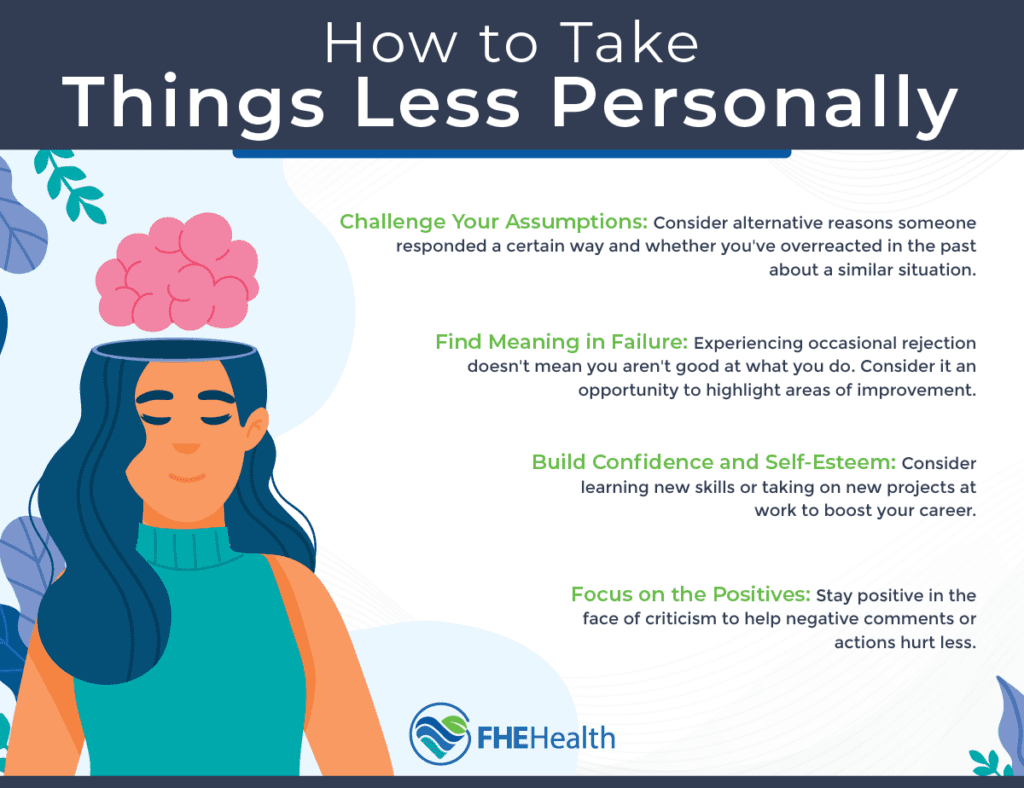
Experiencing days when you’re a bit more sensitive to criticism or feedback is normal. Maybe you’re feeling unusually stressed or didn’t get enough sleep the night before. However, getting defensive or upset every time someone points out areas for improvement can indicate you’re prone to taking things too personally.
Criticism is an inevitable part of life, and it isn’t always meant to insult or offend. For example, feedback from a boss or parent can include tips or actionable advice to help you improve a skill or behavior. But determining whether criticism is helpful or hurtful can be difficult.
Keep reading to understand why we take things personally and how to reframe your mindset to encourage healthier thoughts and habits.
Understanding Why We Take Things Personally
There isn’t a single reason why people take things personally. They may misinterpret someone else’s words or actions and believe they’re being mistreated or disrespected. Other times, taking criticism personally stems from struggling with low self-esteem or self-confidence, triggering feelings of inadequacy or failure.
These feelings are particularly common in individuals with anxiety or depression. A 2019 study explored the correlation between low self-esteem and depression, anxiety or suicidal ideation among Vietnamese students, uncovering a prevalence rate of 19.4%.
Other reasons people may take things personally include:
- Negative self-talk. This can manifest as constantly feeling not good or worthy enough and believing negative things other people say, even if they aren’t true.
- Childhood trauma. Being neglected, abused or blamed for things in childhood fosters beliefs that being mocked or ridiculed is deserved.
- Perfectionism. Believing every action or behavior must be perfect can cause constant worries that others will criticize or judge the smallest mistake or flaw.
- High sensitivity. Being highly sensitive to changes in tone or body language can trigger beliefs of being criticized or mocked.
- Stress or fatigue. Being stressed or overtired can hinder the ability to effectively communicate, which includes misinterpreting the meaning behind someone’s words or actions.
Signs You May Take Things Too Personally
Getting easily angered when someone offers an opinion or obsessing over a person’s tone of voice and word choice can indicate you take things too personally. Other signs include:
- Depending on the approval of others for your own happiness
- Failing to set or maintain boundaries
- Viewing mistakes as personal character flaws
- Excessively or needlessly apologizing
- Struggling to say no to requests
- Believing every harsh comment said about you is true
Strategies for Taking Things Less Personally at Work and in Personal Life
Taking things too personally isn’t a character flaw that needs fixing. However, it can negatively affect your mental health and deter you from seeking opportunities to improve your career, relationships and personal goals. If you’re someone who gets easily offended or angered, developing effective coping strategies can improve your behavior in sensitive situations. Explore the following techniques for ideas.
Challenge Your Assumptions
When someone says or does something that bothers you, challenge your initial thoughts and feelings to determine their rationality. Consider whether there could be alternative reasons someone responded a certain way and whether you’ve overreacted in the past about a similar situation.
For example, if you suggest an idea during a meeting and your manager seems dismissive, don’t assume they don’t value your input or work. They may be stressed about an upcoming project or a family situation. Additionally, if you reach out to a friend to make plans and they turn you down, they may just be busy or tired. Suggest a different weekend before assuming they don’t want to spend time with you.
Find Meaning in Failure
Failure never feels good. When your boss rejects a project proposal or a client expresses dissatisfaction with your latest work, your self-esteem and confidence may decline. However, experiencing the occasional rejection doesn’t mean you aren’t good at what you do. Consider it an opportunity to highlight areas of improvement. Ask your boss or client why they didn’t like the work, and use that feedback to determine how to do better next time.
Build Confidence and Self-Esteem
When struggling with low self-esteem and confidence, you’re more likely to assume others don’t think highly of you. However, increasing your self-esteem can improve your mental health, boosting your overall mood and confidence. Consider finding a hobby, such as painting or exercising, to learn new skills and establish a personal goal to work toward.
You can also offer to take on new projects at work or learn new skills relevant to your job to boost your career. Trying new things may seem scary, but it can help identify your strengths and weaknesses. This can encourage you to gravitate toward opportunities that use those strengths and pinpoint methods of improving your weaknesses. You also may uncover skills or talents you hadn’t realized you possessed.
Focus on the Positives
Staying positive in the face of criticism isn’t easy, but it can help negative comments or actions hurt less. For example, if your manager assigns an important project to another colleague over you, don’t assume they think you’re incapable or incompetent. Managers delegate projects based on personal skills and strengths. You don’t want to get stuck working on something you don’t understand or can’t effectively complete.
Additionally, if a friend or family member mocks or criticizes an achievement of yours, it may be from a lack of understanding or jealousy. Don’t let someone else’s bitter feelings dampen your mood. Try journaling about it or reciting positive affirmations, such as “I’m proud of myself” or “I worked really hard to accomplish this.” These serve as reminders that your opinions matter more than those of others.
Seek Professional Help to Improve Your Self-Worth
Learning how to not take things personally offers several benefits. It can help you increase self-esteem, become more confident, set healthy boundaries and facilitate open, positive communication with others. These skills apply to both professional and personal settings, helping improve your productivity and relationships in all aspects of life.
If you’re struggling to stop taking things personally on your own, reach out to FHE Health. We offer a range of mental health programs, therapies and resources that can help identify where this reaction comes from and how to move forward. Contact us today, and take the first step toward improving your self-worth.







